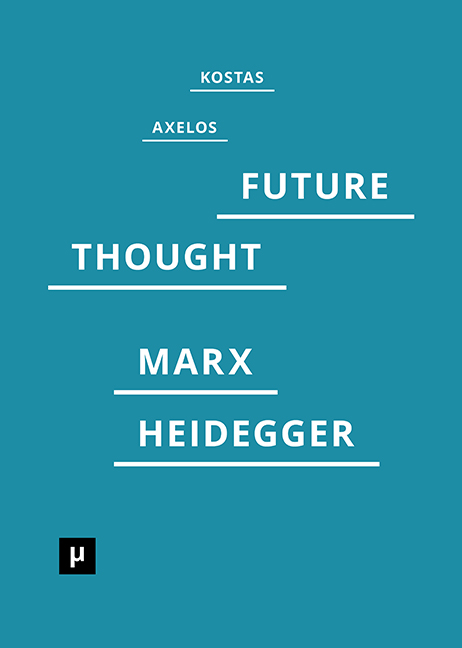Kostas Axelos: Introduction to a Future Way of Thought: On Marx and Heidegger (1966/2015)
Filed under book | Tags: · earth, labour, philosophy, philosophy of technology, production, technology

“‘Technologists only change the world in various ways in generalized indifference; the point is to think the world and interpret the changes in its unfathomability, to perceive and experience the difference binding being to the nothing.’
Anticipating the age of planetary technology Kostas Axelos, a Greek-French philosopher, approaches the technological question in this book, first published in 1966, by connecting the thought of Karl Marx and Martin Heidegger. Marx famously declared that philosophers had only interpreted the world, but the point was to change it. Heidegger on his part stressed that our modern malaise was due to the forgetting of being, for which he thought technological questions were central. Following from his study of Marx as a thinker of technology, and foreseeing debates about globalization, Axelos recognizes that technology now determines the world. Providing an introduction to some of his major themes, including the play of the world, Axelos asks if planetary technology requires a new, a future way of thought which in itself is planetary.”
First published as Einführung in ein künftiges Denken: Über Marx und Heidegger, Niemeyer, Tübingen, 1966.
Edited and with an Introduction by Stuart Elden
Translated by Kenneth Mills
Publisher meson press, Lüneburg, June 2015
Creative Commons BY-NC-ND 4.0 License
ISBN 9783957960061
178 pages
Review: George Tomlinson (Marx & Philosophy 2016).
Comment (1)Erich Hörl: The Technological Condition (2011/2015)
Filed under paper | Tags: · cybernetics, ecology, philosophy, philosophy of technology, subjectivity, technics, technology, work
Partial translation of the introduction to Die technologische Bedingung. Beiträge zur Beschreibung der technischen Welt, ed. Hörl (Suhrkamp 2011), a book “seeking to reformulate the (media)technical question under neocybernetic conditions at the beginning of twenty-first century. As such, it is part of a three-volume project. It follows Die Transformation des Humanen. Beiträge zur Kulturgeschichte der Kybernetik, eds. Michael Hagner and Erich Hörl (Suhrkamp 2008), and it will be followed soon by On General Ecology. The New Ecological Paradigm in the Neocybernetic Era, ed. Hörl.”
Translated by Anthony Enns
Published in Parrhesia 22, 2015, pp 1-15
Open access
More from Erich Hörl, and on philosophy of technology and media ecology.
Comment (0)Zeitschrift für Medienwissenschaft 8: Medienästhetik (2013) [German]
Filed under journal | Tags: · aesthetics, art, cybernetics, media, media theory, networks, philosophy of technology, technology

Der Schwerpunkt «Medienästhetik» findet seinen Ausgangspunkt in einer Beobachtung Félix Guattaris, die in ihrer ganzen Dringlichkeit vermutlich erst heute einzusehen ist: Die Produktion von Subjektivität, die mit der allgemeinen Kybernetisierung der Lebensform einhergeht, wurde von Guattari als eine Frage der Ästhetik pointiert. Die medientechnologische Situation, die hinter dieser Neubewertung des Ästhetischen steckt, hat sich in den letzten zwanzig Jahren durch den Eintritt in eine Prozesskultur, wie sie die multiskalaren, netzwerkbasierten, environmentalen Medien des 21. Jahrhunderts bringen, ebenso verschärft wie ausdifferenziert.
Mit Beiträge von Félix Guattari, Luciana Parsi, Erich Hörl, Geert Lovink, Olga Goriunova, Jens Schröter, Yuk Hui, Shintaro Miyazaki, Anke Heelemann, Petra Löffler, Olivier Simard, Ute Holl, Nacim Ghanbari, Sebastian Haunss, Beate Ochsner, Isabell Otto, Tristan Thielmann, Ralf Junkerjürgen, Juliane Rebentisch, Michaela Ott, Jan Distelmeyer, Oliver Leistert, Theo Röhle, Maja Figge, Daniela Wentz und Sebastian Gießmann.
Guest edited by Erich Hörl and Mark B. N. Hansen
Publisher Diaphanes, Zürich, 2013
ISBN 9783037342404
ISSN 1869-1722
Open Access
216 pages
PDF (single PDF)
PDF (PDF articles)

